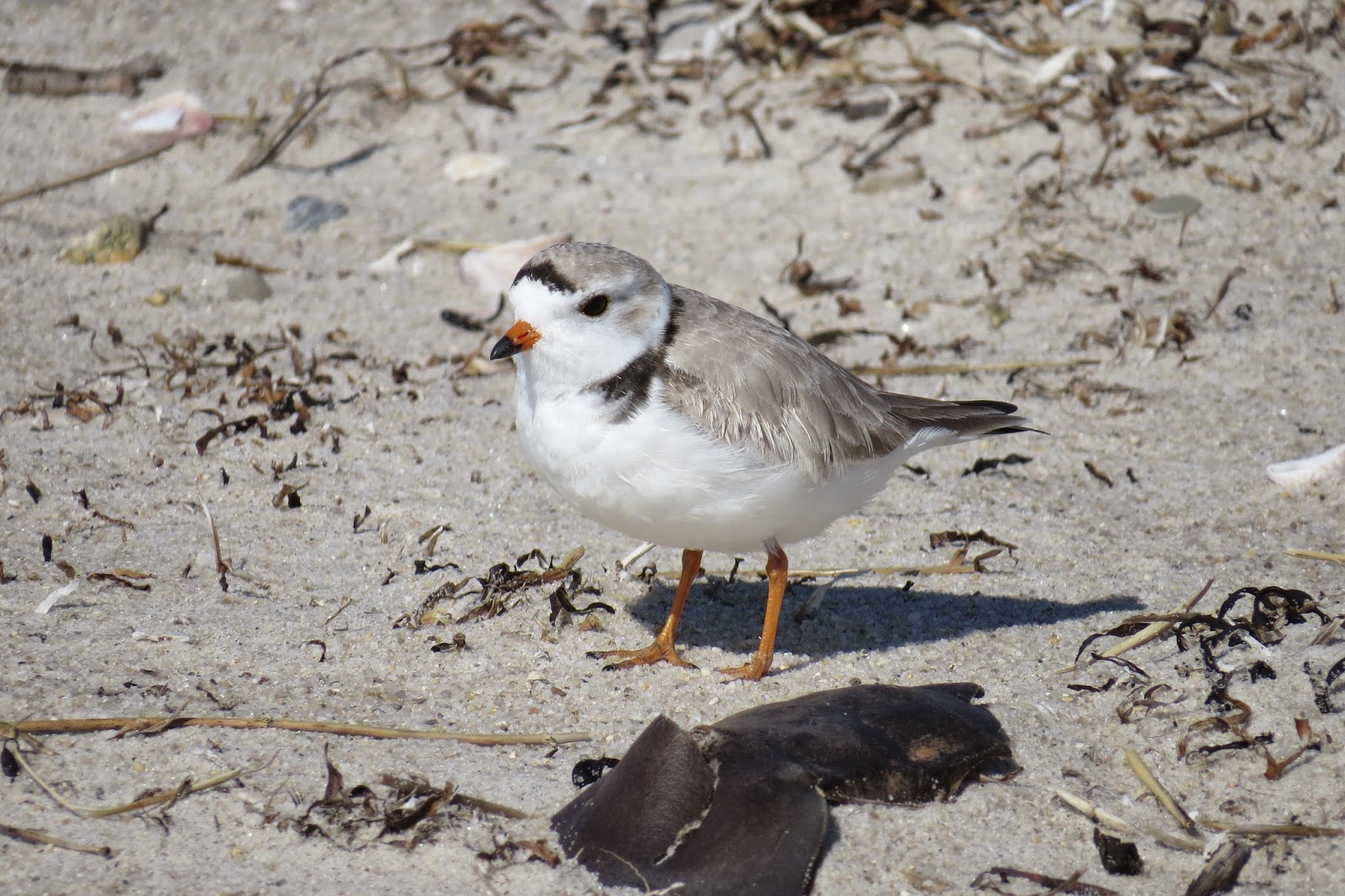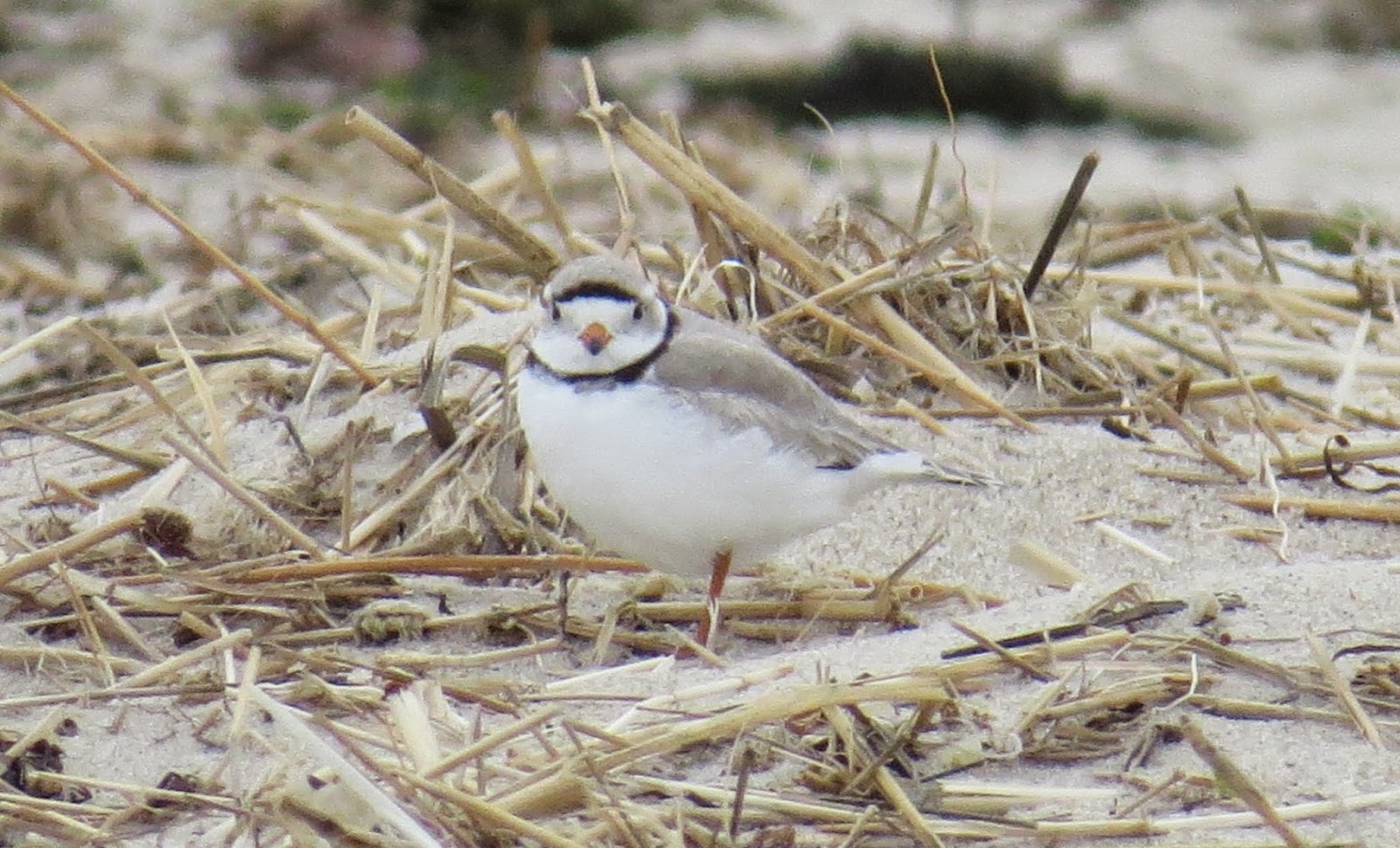Why all the fuss over these cute little birds?
I photographed a number of these fellows last spring on Hardings Beach in Chatham upon their arrival from the south. Since then I have listened to both preservationists, beach-goers, and off-road vehicle (ORV) owners voice their varied opinions. One frequently hears how plover meat tastes quite good, like chicken. It's quite a lively debate.
 |
| Hardings Beach 4/3/14 |
Shore birds were first stressed in the 19th and early 20th century by hunters who collected feathers for sale in fashion markets. When beaches became very popular for humans to visit in the 40's and 50's, plovers were especially stressed as we gradually took over their natural breeding grounds. Their numbers dropped and their survival became threatened.
The National Seashore, the National Fish and Wildlife Service and many of the towns on the Cape are going out of their way to preserve these birds. Nesting sites are protected during the breeding season from the time shallow nests are scraped in the sand until hatched chicks can take to the air. This is an inconvenience to beach-goers and ORVs who want access to the beaches. ORV restrictions can stretch from May through July.
The coloring of these birds makes them very difficult to see, even if you are looking carefully. The nests and eggs are even more difficult to spot. Sand-colored eggs take about a month to hatch. Chicks do not take to the air for about a month after hatching. During the period when chicks scurry up and down the beach to feed, they are extremely vulnerable. In addition, chicks burn precious energy to avoid beach walkers and ORVs. For these reasons breeding areas are roped off and vehicle travel is prohibited during critical periods.
 |
| Plovers are very well camouflaged in a beach environment. Hardings Beach 4/3/14 |
"Threatened species" are legally protected under the Endangered Species Act of 1973. The purpose of the act is "to halt and reverse the trend toward species extinction, whatever the cost." But why are we so concerned about species extinction? Biologists (e.g. Harvard's Edward O. Wilson) estimate that the rate of global species extinction is 1,000 to 10,000 times the background rate. The background rate is defined as the rate of species loss before the influence of man. We (humans) are the cause of the greatest rate of species extinction since the time of the die-out of the dinosaurs, 65 million years ago.
My barber raises a question about species loss.
During a recent visit to get my thinning and graying hair trimmed at our local barbershop in Brewster, I got into a discussion about these plovers. My barber is very astute. He informed me without hesitation that we are in the middle of a mass extinction event. He implied that because we are losing so many species each year, perhaps we are expending too much effort to save these particular little guys.
 |
| Piping plover pondering my presence in his/her potential breeding area. Hardings Beach 3/29/14 |
Let's save the plovers.
The above argument is an easy cop-out. Shouldn't we try to control our local environment as best we can? We have much less control over ecosystems in other parts of the world. So I am for the protection of the piping plover here on our beaches.
Secondly, what would the vacationers say if they learned that we are sacrificing this cute species to please beach-goers and ORV drivers who don't wish to be inconvenienced by restrictions? I don't think this would help to enhance the public perception of our "pristine" Cape Cod. At this point, images of plovers have become iconic on the Cape.
Finally, our presence on Cape beaches initially stressed the plover breeding habitat. Don't we owe it to these birds to do what we can to insure their survival as a species? We can't be so arrogant to think that our species is more important than theirs. (Or are we?)

Nantucket has roped off the area around the Great Point Lighthouse for breeding Piping Plovers as well as an effort to try and grow sea grass to prevent erosion. They've also changed the law and no vehicles are allowed in that area any more to prevent damage to both birds and beach. There are many fund raising efforts for the Amazon Rain Forrest. I'm not sure whether those funds have helped make much of a difference. But it doesn't take a lot of money to save Piping Plovers and prevent beach erosion. It requires changing the laws so that ORV drivers and beach-goers are restricted. In fact, why do we need any ORVs at all anywhere? Why can't we try walking?
ReplyDeleteORV use on Cape beaches is a decade long tradition. ORV users would be very upset (rebellion would ensue) if they were prohibited from driving on the beaches. In addition, the sale of ORV permits is a significant income stream for the towns, e.g. Orleans issues about 2700 permits. Non-resident permits cost almost $200 for a season. Although I agree with you that it is surprising, indeed shocking, that so many vehicles are allowed to drive on the most valuable resource the Cape possesses, I am pessimistic that this tradition will disappear anytime soon.
ReplyDeleteYes, it is all about money the towns collect and the selfishness and disregard of the ORV permit holders. But the way to start would be to restrict ORVs to certain times of day, of the year, perhaps non-resident's would not be allowed to get a permit. Change has to start some where if we care about our beaches and our birds.
DeleteIt may be the other island (not Nantucket), but see what "Jimmy, Jimmy, John, Nick and Laurie" are up to these days. Besides keeping a jet port off the Vineyard back in the seventies (won a battle; lost a war) what happened to Boomer activism, especially now that we're retiring…or maybe that is who we are/have been: retiring (sure sounds less pejorative than irresponsible, infantile, and without honor!).
ReplyDeleteConsider "Shouldn't we try to control our local environment as best we can?" over that cup of hot chocolate in front of the gas fireplace…& within the context of "think globally, act locally." Given our unconstitutional currency and it's role in CapitalismFail with its Anthropocene, isn't what should be controlled an avoided and local responsibility?
The "as best we can"
'Tis a phrase that delimits
What honor demands
…and the liberal moral meme is not that big on honor (& a stranger to its sacred version—to the point of it being an anathema./?).
http://www.sei-international.org/mediamanager/images/News/SEI-2015-news-Anthropocene-update-lg.png
"I'm gonna cash in my hand and pick up on a piece of land
and build myself a cabin* back in the woods.
Lord, it's there I'm gonna stay until there comes a day
when this old world starts to changing for the good.
Now the reason I'm smiling is over on a island on a hillside in the woods where I belong.
I wanna thank Jimmy, Jimmy, John, Nick and Laurie, the No Jets Construction
for setting me down a homestead on the farm, whoa, ooooo." JT
* condo?!?
=)
Greg
At your prompting I listened to mellow JT this morning crooning about a cabin back in the woods. Not a bad way to start a day. (Who were Jimmy, et.al. anyway?)
DeleteI confess that I love my hot chocolate in front of the gas fire. It's comfortable and cozy after I return from walks on the frigid, windswept beaches. Perhaps I am in that "retired" crowd that has paid short shrift to activism. But I "do what I can" to discuss plover, beach driving, biodiversity and other issues with the local residents. I have faith that spreading information does help.
Hi to Tina.
By my calculus, whatever we can do to increase the chances that we will go extinct non-violently, does help. The degree of violence that characterizes our demise as a "civilized" species is our remaining choice. Spreading information about how badly we've f*#ked up could help…at least it can't hurt.
DeleteI often think of your experience trying to wake up a civic group here in Cornwall and getting all but laughed out of the room. A few years back I made a somewhat similar effort only to be ignored. Perhaps my rather large self-esteem blinds me to just how eclectic I am perceived to be.
People seem to trust that we'll muddle through. On whatever that hope is based (wishful thinking?), it sure ignores science and math. However, it is what, in good faith, is done; is hoped. Unfortunately, like Yurtle, we are mud bound. The arctic methane "burps" are but one of many factors destabilizing our tower of pious comfort (specie extinction rate another), we've a long way to fall baby (a paraphrasing of the cigarette ad from the late '60s: "you've come a long way baby"). "Progress" has been retrograde, the pursuit of security has increased insecurity, and freedom is now the right to be irresponsible. Orwellian doublespeak shape our psyches.
Referencing "The Matrix", the other day I used the phrase 'Blue Pill liberals' to characterize the current self-styled "activists" of our generation. I doubt it will be received any better than the label "loyal opposition" that I've used before. Since I made my last comment here I've been thinking about what constitutes honor within the liberal moral meme. I'm considering that it is pragmatism and embracing plurality. Such seems to be what is behind the retiring Boomer's lack of action. In the face of klimakatastrophe (German word of the year in 2007–no comparable word yet exits in English) of the Anthropocene, doing what we can comfortable get around to seems to be our hallmark; our 'as-good-as-it-gets'. The crowd crowding in to occupy this as activism is legion.
I will pass on your greetings to Tina, do the same for me with Mary. I'm planning on doing some maple sugaring this season (might start in a week or so) after a 40 year hiatus. I've been working on a modified rocket stove evaporator that will use wood fuel much more efficiently…but maybe too much so. I'm hedging my bets with alternative (read more conventional) means of boiling sap. Like my ranting here, it's a great distraction action. Thanks for tolerating me.
;)